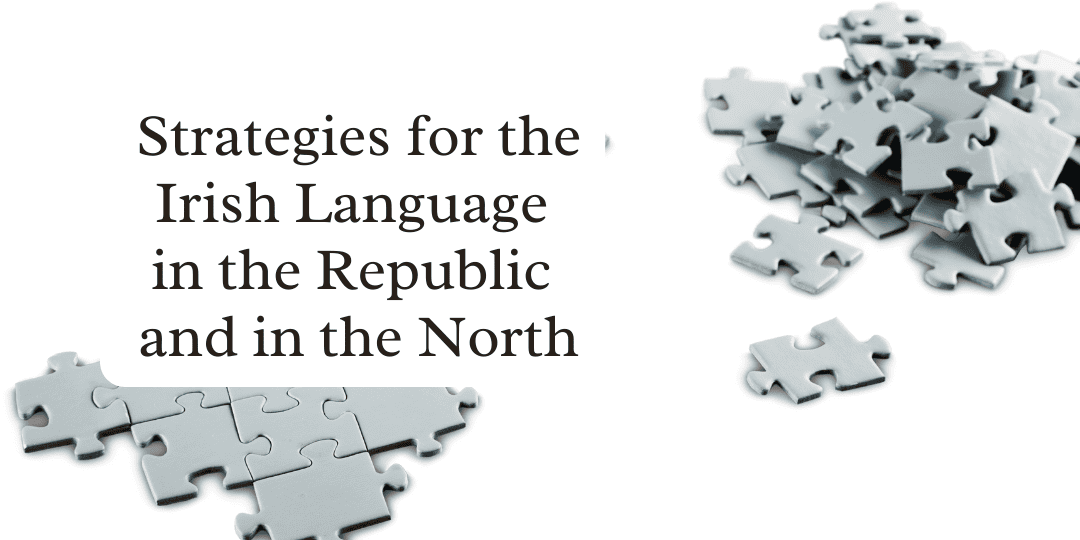
Irish Language Strategies in the Republic and in the North
This article summarises the strategies relating to the Irish Language in the Republic and in the North.
20-Year Strategy for the Irish Language in the Republic
The 20-Year Strategy for the Irish Language 2010-2030 was published on 21 December 2010, following cross-party support in the Houses of the Oireachtas. The Strategy promotes a holistic, integrated approach to the Irish language which is consistent with international best practice. The Strategy is the result of a consultative and research process, including a report commissioned by the department (DCU, 2009), the Comprehensive Linguistic Study of the Use of Irish in the Gaeltacht (NUIG & NUIM, 2007), and the report of Coimisiún na Gaeltachta (2002).
The 20-Year Strategy for the Irish Language 2010-2030 is the policy of the State for the Irish Language. The Strategy has cross-departmental ownership and, accordingly, responsibility for its implementation falls on a number of government departments, bodies and Irish language and Gaeltacht organisations.
The Department of Media, Tourism, Arts, Culture, Sport and the Gaeltacht is responsible for co-ordinating its implementation.
The Strategy is available in its entirety here.
Areas of action
Nine areas of action are set out in the Strategy, namely:
- education
- the Gaeltacht
- language transmission by the family – early intervention
- administration, services and community
- media and technology
- dictionaries
- legislation and status
- economic life
- cross-cutting initiatives
As a result of a consultation process organised by the department on the matter, the need for a 5-Year Action Plan was identified. Please click here for more information on the action plan and progress to date.
The 20 Year Strategy in the North
In January 2015, the Department of Culture, Arts and Leisure published the Strategy to Improve and Protect the Development of the Irish Language: 2015 – 2035. This strategy gives guidance to the Executive and lays down aims regarding the development of the Irish language in years to come.
This strategy is based on the responsibilities that the Government have accepted through the following agreements: The Good Friday Agreement 1998, St. Andrews Agreement 2006, Programme for the Government 2011-2015, The European Charter for Regional and Minority Languages and The UNESCO Convention regarding the Protection of Cultural and Natural Heritage. The strategy aims to tackle the challenges that the Irish language faces and to promote the Irish language as a normal spoken language.
Here are the objectives that are laid down in the strategy:
- To increase the amount of people who acquire the Irish language through Irish-medium education
- To increase the amount of people who are learning Irish through English-medium education
- To increase the amount of people who are learning Irish outside of the formal education system
- To support an increase in the amount of children who are being raised through Irish
- To fulfill all the obligations regarding the Irish Language under the European Charter for Regional and Minority Languages
- To increase access to high quality Irish language media
- To increase awareness regarding the economic and social value of the Irish language
- To gain legislative protection for the Irish language
- To develop community-based, local, sustainable and high quality initiatives
- To encourage the provision of opportunities to use the Irish language among a broad range of people, including families, social networks and community networks.
- To support the community of people who speak Irish on a daily basis
- To increase positive attitudes regarding the Irish language in all areas of the community
- To increase positive attitudes regarding the Irish language in the Protestant, Unionist and Loyalist communities
Updated: May 2024






